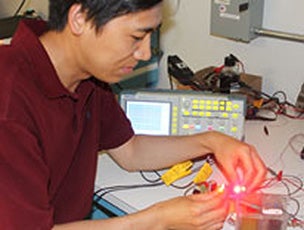Gates’ Grand Challenges Explorations funding to aid waste-to-electricity transformation
The University of Colorado Denver announced Monday that it will receive funding through Grand Challenges Explorations, an initiative created by the Bill & Melinda Gates Foundation that enables researchers worldwide to test unorthodox ideas that address persistent health and development challenges.
Assistant Professor Zhiyong (Jason) Ren in CU Denver’s College of Engineering and Applied Science will pursue an innovative global health research project, “Direct electricity from fecal sludge in bioelectric systems.”
Grand Challenges Explorations funds scientists and researchers to explore ideas that can break the mold in how to solve persistent global health and development challenges. Ren’s project is one of 110 Grand Challenges Explorations grants announced this week.
“We believe in the power of innovation — that a single bold idea can pioneer solutions to our greatest health and development challenges,” said Chris Wilson, director of Global Health Discovery for the Bill & Melinda Gates Foundation. “Grand Challenges Explorations seeks to identify and fund these new ideas wherever they come from, allowing scientists, innovators and entrepreneurs to pursue the kinds of creative ideas and novel approaches that could help to accelerate the end of polio, cure HIV infection or improve sanitation.”
Projects that are receiving funding show promise in tackling priority global health issues where solutions do not yet exist. This includes finding effective methods to eliminate or control infectious diseases such as polio and HIV as well as discovering new sanitation technologies.
CU Denver’s Ren proposes to develop a low-cost, easy-to-operate bioelectric system that can directly convert human waste to usable electricity. If successful, the technology will provide a self-sustainable solution for communities in need of both sanitary waste disposal and energy supply.
Grand Challenges Explorations is a $100 million initiative funded by the Bill & Melinda Gates Foundation. Launched in 2008, Grand Challenge Explorations grants have been awarded to nearly 500 researchers from over 40 countries. The grant program is open to anyone from any discipline and from any organization. The initiative uses an agile, accelerated grant-making process with short, two-page online applications and no preliminary data required. Initial grants of $100,000 are awarded twice a year. Successful projects have an opportunity to receive a follow-on grant of up to $1 million.


